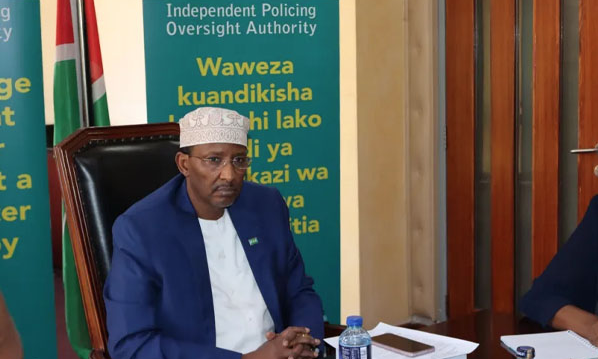

Police watchdog Independent Policing Oversight Authority has raised concern over police officers' failure to report fatalities occurring in their hands.
In its latest protest monitoring report, Ipoa says although 65 deaths resulted from four protests between June last year and July this year, the National Police Service disclosed only five.
This is in breach of the Sixth Schedule of CAP 84 of the Laws of Kenya, which makes it mandatory for police to report all such deaths to the authority.
“In the four protests covered by this report, Ipoa documented 65 fatalities as at July 23. The Authority also recorded injuries to 342 civilians and 171 police officers during the protests as at July 23,” the report says.
“In line with the provisions of the Sixth Schedule of the CAP 84 of the Laws of Kenya, the NPS notified Ipoa of five deaths of the 65 fatalities documented. The failure to notify Ipoa of deaths undermines independent oversight, violates legal reporting obligations and signals a worrying culture of non-compliance.”
Police have denied obstructing the work of Ipoa or any other oversight agencies, including the Internal Affairs Unit.
Spokesperson Muchiri Nyagah says the service operates within the law and any officer found to have violated it is held accountable if there is sufficient evidence and is subjected to due process.
Of the 65 documented fatalities, Ipoa says it has witnessed 61 postmortems as part of its investigations and will attend the remaining four when they are scheduled.
The report also urges Inspector General of Police Douglas Kanja to prevent officers deployed to protest scenes from concealing their identification or using unmarked vehicles, which makes accountability difficult.
“To enhance accountability, identification and emergency response, the Inspector General of Police should ensure all police assets and vehicles are clearly marked,” it says.
“Additionally, the IG should adopt the use of body-worn cameras and videography during protests to strengthen accountability and support evidence-based prosecution of offenders.”
Ipoa takes issue with what it describes as the often-predictable confrontations between protest organisers and police when the former seek to notify authorities of upcoming protests.
The report says police officers frequently refuse to receive written protest notifications or later deny ever receiving them.
In other instances, police reportedly use force to block protests, despite being formally notified in advance.
Officers often claim that the protests are not "allowed," even though the law does not give police the authority to permit or deny assemblies. Organisers are only required to notify authorities, not to seek approval.
Ipoa has urged the IG to create mechanisms for structured and peaceful engagement with protest organisers. It says such collaboration will help in the humane and effective management of public assemblies.
“The Inspector General of Police should establish mechanisms for proactive engagement with protest organisers to reduce tension and foster mutual agreements on the security and management of assemblies. This collaborative approach will support humane, citizen-centred policing,” the report says.
Additionally, the authority recommends that the IG initiates a national civic sensitisation programme targeting civil society organisations working in areas such as police reforms, human rights, national security, public order and the right of peaceful assembly.
Instant analysis
The claims by Ipoa reveals systemic non-compliance by police with legal oversight mechanisms, indicating institutional resistance to accountability. It also exposes structural weaknesses in the management of public order and civil liberties.












